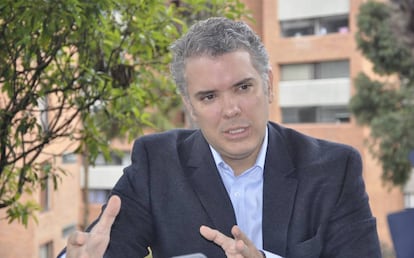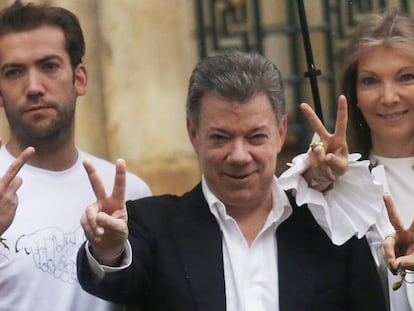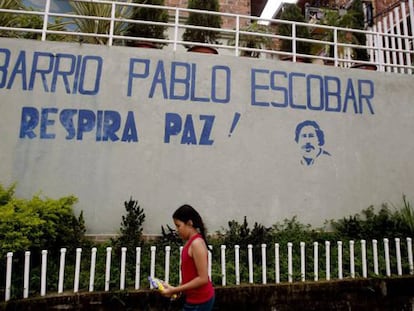¡°It¡¯s not about ripping up the FARC accords, but about making significant changes¡±
Nominee for the Colombia Democratic Center discusses the need to end ¡°impunity¡± and to foster reform


Iv¨¢n Duque is the presidential candidate for Colombia¡¯s Democratic Center, the party founded in 2013 by former president ?lvaro Uribe, for whom Duque once worked as an advisor. The 41-year-old senator from Bogot¨¢ has also worked for the Inter-American Development Bank (IDB) in Washington DC.
While he awaits further developments in his party¡¯s efforts to forge an electoral coalition with former conservative president Andr¨¦s Pastrana, Duque has been spending the time in pre-campaign mode. If the May elections hand him the keys to the Casa de Nari?o, Duque has pledged to review the peace accords with the FARC guerrillas, and to encourage economic and social reform.
On Friday of last week, Duque outlined the key pillars of his platform in a meeting with EL PA?S ahead of a panel discussion at Madrid¡¯s Foro Nueva Econom¨ªa this Thursday.
The situation in Venezuela is alarming, because there¡¯s a dictatorship by a despot who is oppressing his people
Question. Your own nomination was formalized in December, yet the alliance of forces that oppose the peace accords is still unclear.
Answer. I am the Democratic Center¡¯s only presidential candidate. There¡¯s been an effort to consolidate a big-tent coalition with various constituencies. We would like to keep traveling throughout the country to discuss our proposals, and to reach the presidency in order to give Colombia a great agenda of reform that will allow the country to restore legality, increase entrepreneurship and undertake great social reforms aimed at greater equality.
Q. When you decided to run, you told EL PA?S that there were multiple issues at stake in this election, not just the peace process or corruption. What are they?
A. The country needs an economic recovery. Otherwise, the effects will be felt at all levels: health, education, jobs. We have to eliminate all unnecessary expenses in government, overhaul public agencies to become a more efficient state, do more with less, reduce income tax and value-added tax evasion. This will enable us to reduce taxes for businesses that create jobs, thereby increasing investment, improving job quality and raising workers¡¯ incomes so the economy can recover and reach a growth rate of more than five percent.
Q. And besides the economy?
It is essential to increase transparency at all levels of government
A. There are legal issues involving the impunity in this country for FARC criminals; our agenda includes dealing with criminal drug gangs, with the rise in illicit crops, and with the ELN guerrilla. For that, the state will need a great capacity for offensive and deterrence action, in cooperation with the justice system. And the country needs a new social agenda, because there is a lot of concern about the quality and service of our health system; Colombia also needs to make its pensions system viable.
Q. You¡¯ve talked about the ¡°orange economy.¡± What is that?
A. It is a series of sectors that contribute more to the Colombian economy than coffee and mining. We¡¯re talking about the arts, the media, about functional creations like architecture, design, advertising, about our archeological heritage, our cuisine, our museums and libraries. All of those sectors have enormous potential for economic growth. They are based on culture, services and technology, and they are strategic partners to a pivotal sector, tourism.
Q. If you win, what will you do about the peace accords?
A. I have always said that it¡¯s not about destroying or ripping up the accords, but about making significant changes to the elements that affect the rule of law.
Q. Such as?
A. It is a very serious thing that FARC leaders have been allowed to run for the presidency and for Congress without telling the whole truth, without providing victims with compensation, and without serving sentences for their crimes. This is very detrimental to the country. Besides that, illicit crops are on the rise in Colombia, and they [FARC leaders] managed to get drug trafficking considered a crime eligible for amnesty by linking it to political crimes. They ensured that eradicating illicit crops would be a voluntary act, not a mandatory one. If I reach the presidency, I will propose a constitutional reform to encode that drug trafficking is not eligible for amnesty. And illicit crop eradication will be mandatory. Thirdly, it is paramount to send a message to the FARC that any weapons that were not turned over and any money that was not used to compensate the victims means that leaders lose all their benefits. Right now, the Special Jurisdiction for Peace is an impunity mechanism that makes the perpetrators of crimes against humanity eligible for politics. This is a mockery and an affront to their victims and to our rule of law.
We have to eliminate all unnecessary expenses in government
Q. You would also have to deal with the ELN.
A. The ELN is a bloodthirsty, terrorist organization. And I find it very serious that the government has accepted a bilateral ceasefire as though we were talking about two equivalent armies. The Colombian state cannot renounce the defense of life, honor and assets of all Colombians, or to lose its offensive and deterrence capabilities against armed actors. If the ELN wants to demobilize, disarm and return to the fold of society, it should accept territorial concentration with international oversight and monitoring by military forces. There could be sentence reductions, but no elimination of proportional and effective punishment for top officials.
Q. Former president Uribe remains in the front lines of politics and travels with you everywhere. How much weight will he carry in the presidential race?
A. We work with Uribe as a team. He is running for the Senate, and I am running for the presidency. We are traveling the country together to discuss our proposals, and I hope that he will head our party¡¯s representation in Congress after the parliamentary elections, when we consolidate our position as the main political force in the chamber. Under Uribe¡¯s leadership in Congress, and with Iv¨¢n Duque as president, we can push forward this agenda of reform for Colombia.
Q. Corruption, one of the main causes of indignation among Colombians, has reached the heart of the justice system. Is it possible to eradicate it in the short run?
A. Corruption must be fought tirelessly. First we must empower citizens to report it through telephone hotlines and social networks, so corrupt individuals will know that society is watching. Secondly, I am working on a project to ensure that corrupt individuals are stripped of the assets that they themselves took from the Colombian people. Third: No prison benefits for corruption convicts. Fourth: any company that bribes a government worker will be barred from future contracting work. And it is essential to increase transparency at all levels of government.
Q. Your adversaries will use the shadow of the Odebrecht case and its alleged ties to your party in order to attack you.
A. I have no ties to Odebrecht, and never have. The National Electoral Board has already exonerated ?scar Iv¨¢n Zuluaga, who was the presidential candidate. And I reported Odebrecht to industry and commerce authorities to request top sanctions against the company for securing a contract through bribes.
Q. What can Colombia do for Venezuela?
A. The situation in Venezuela is alarming, because there¡¯s a dictatorship by a despot who is oppressing his people. While Colombian authorities remained silent, I denounced Nicol¨¢s Maduro before the International Criminal Tribunal with signatures by 76 senators from Colombia and over 50 from Chile. We need for Latin America to keep denouncing this kind of behavior, so that Maduro will be the target of a formal investigation over the systematic crimes against his people.
English version by Susana Urra.
Tu suscripci¨®n se est¨¢ usando en otro dispositivo
?Quieres a?adir otro usuario a tu suscripci¨®n?
Si contin¨²as leyendo en este dispositivo, no se podr¨¢ leer en el otro.
FlechaTu suscripci¨®n se est¨¢ usando en otro dispositivo y solo puedes acceder a EL PA?S desde un dispositivo a la vez.
Si quieres compartir tu cuenta, cambia tu suscripci¨®n a la modalidad Premium, as¨ª podr¨¢s a?adir otro usuario. Cada uno acceder¨¢ con su propia cuenta de email, lo que os permitir¨¢ personalizar vuestra experiencia en EL PA?S.
En el caso de no saber qui¨¦n est¨¢ usando tu cuenta, te recomendamos cambiar tu contrase?a aqu¨ª.
Si decides continuar compartiendo tu cuenta, este mensaje se mostrar¨¢ en tu dispositivo y en el de la otra persona que est¨¢ usando tu cuenta de forma indefinida, afectando a tu experiencia de lectura. Puedes consultar aqu¨ª los t¨¦rminos y condiciones de la suscripci¨®n digital.










































